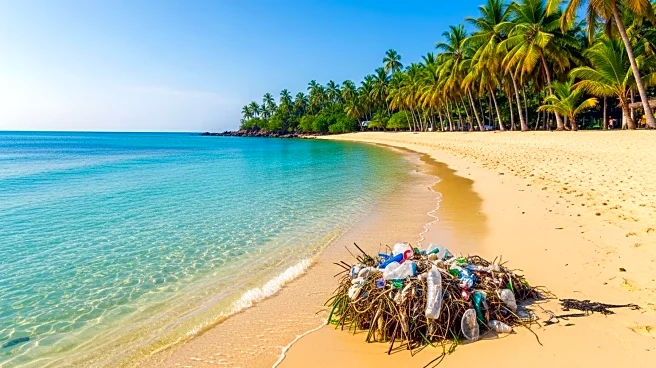What is the story about?
What's Happening?
Bali, renowned for its stunning beaches and vibrant culture, is facing a severe garbage crisis exacerbated by tourism. The island's largest landfill, Suwung TPA, is overwhelmed with 1,800 tons of waste daily, much of which is attributed to the tourism sector. Environment Minister Hanif Faisol Nurofiq has highlighted that approximately 500 tons of this waste comes from hotels and resorts. The Indonesian government has issued a three-month ultimatum to star-rated hotels to manage their waste responsibly, warning of potential sanctions for non-compliance. This move aims to protect Bali's environment and preserve its cultural and natural allure, which are vital to its tourism industry.
Why It's Important?
The garbage crisis in Bali poses a significant threat to its tourism industry, which is a major economic driver for the island. The environmental degradation caused by unchecked waste impacts local communities and ecosystems, potentially deterring tourists who seek Bali's natural beauty. The government's ultimatum to hotels underscores the need for sustainable tourism practices to ensure the long-term viability of Bali as a tourist destination. Failure to address the waste issue could lead to irreversible damage to Bali's environment and cultural heritage, affecting both the local economy and global tourism perceptions.
What's Next?
Hotels in Bali are expected to implement waste management strategies within the three-month deadline set by the government. This may involve investing in sustainable practices and infrastructure to reduce waste production. The government may monitor compliance and enforce sanctions on non-compliant establishments. Additionally, there could be increased collaboration between the tourism sector and local communities to develop eco-friendly solutions. The success of these initiatives will be crucial in maintaining Bali's status as a top tourist destination while safeguarding its environment.
Beyond the Headlines
The garbage crisis in Bali highlights broader issues of sustainable tourism and environmental responsibility. It raises ethical questions about the impact of tourism on local communities and ecosystems. The situation in Bali could serve as a case study for other tourist destinations facing similar challenges, prompting a reevaluation of tourism practices globally. Long-term solutions may involve integrating cultural preservation with environmental sustainability, ensuring that tourism benefits rather than harms local environments and cultures.














